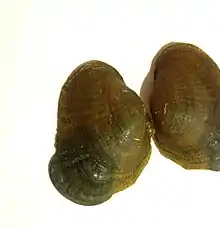Epioblasma ahlstedti
Epioblasma ahlstedti, commonly called the Duck River dartersnapper, is a species of freshwater mussel, an aquatic bivalve mollusk in the family Unionidae, the river mussels.
| Epioblasma ahlstedti | |
|---|---|
 | |
| Female specimen | |
| Scientific classification | |
| Kingdom: | Animalia |
| Phylum: | Mollusca |
| Class: | Bivalvia |
| Order: | Unionida |
| Family: | Unionidae |
| Genus: | Epioblasma |
| Species: | E. ahlstedti |
| Binomial name | |
| Epioblasma ahlstedti Jones and Neves | |
It is native to Alabama and Tennessee in the southeastern United States, where it is endemic to the Tennessee River drainage. Although it is currently known only from the Duck River in Tennessee, museum specimens document that it was also historically found in the Buffalo River, the main stem of the Tennessee River at Muscle Shoals, and in Shoal Creek, Alabama.[2]
Like many freshwater mussels, this species has experienced extreme habitat loss and is now considered globally rare. The last remaining populations are found only in a 30-mile stretch the Duck River, one of the most biologically diverse rivers in North America.[3][2]
This species was described to science in 2010, distinguishing it from the closely related (and also endangered) Epioblasma capsaeformis.
 Male specimen, distinguished by lacking the marsupial swelling (the "claw") of the female
Male specimen, distinguished by lacking the marsupial swelling (the "claw") of the female
References
- The Nature Conservancy
- Jones, Jess; Neves, Richard (2010). "Descriptions of a new species and a new subspecies of freshwater mussels, Epioblasma ahlstedti and Epioblasma florentina aureola (Bivalvia: Unionidae), in the Tennessee River drainage, USA". The Nautilus. 124 (2): 77–92.
- Ahlstedt, Steven; Powell, Jeffery; Butler, Robert; Fagg, Mark; Hubbs, Don; Novak, Sabrina; Palmer, Sally; Johnson, Paul (2017). "Historical and current examination of freshwater mussels (Bivalvia: Margaritiferidae, Unionidae) in the Duck River basin Tennessee, U.S.A.". Malacological Review. 45: 1–163.
